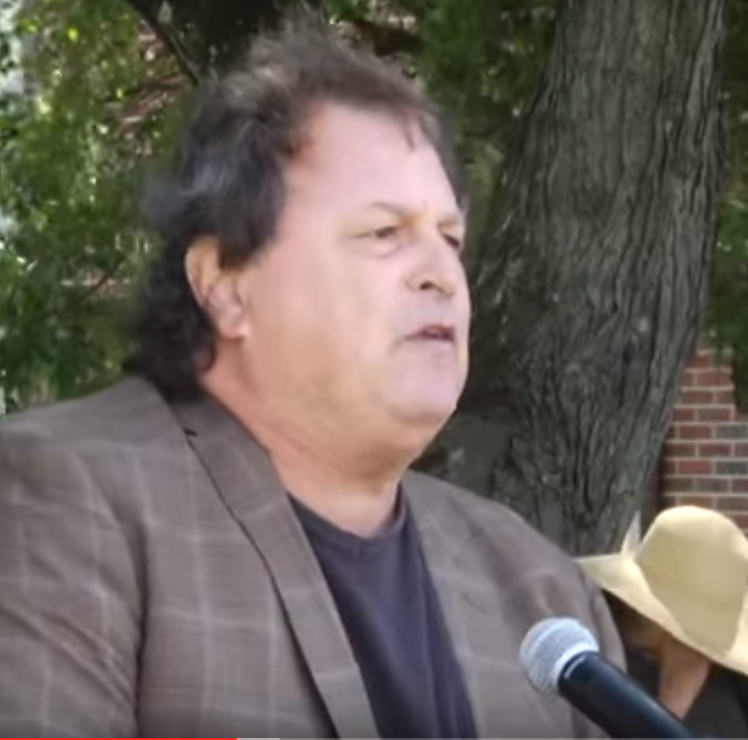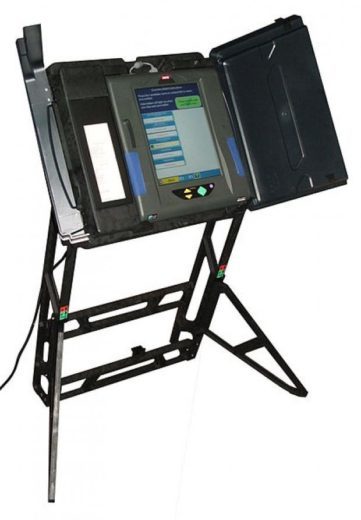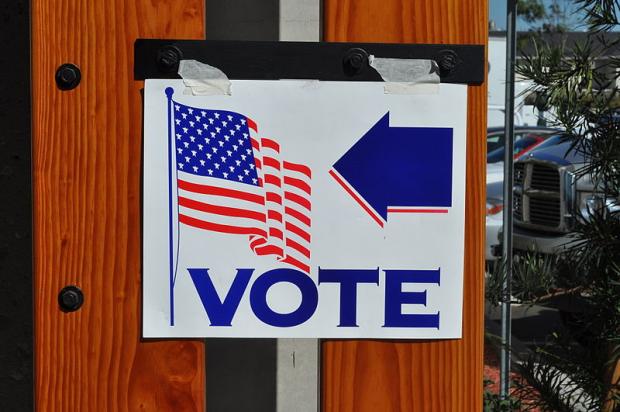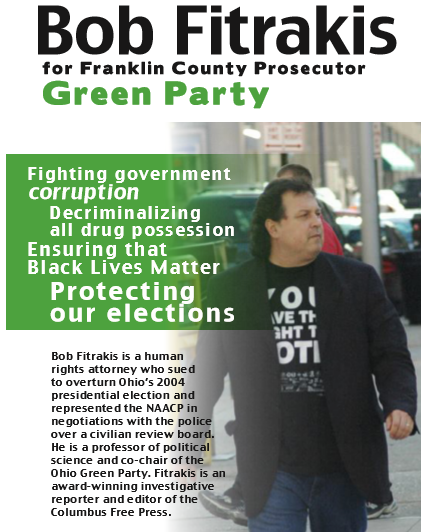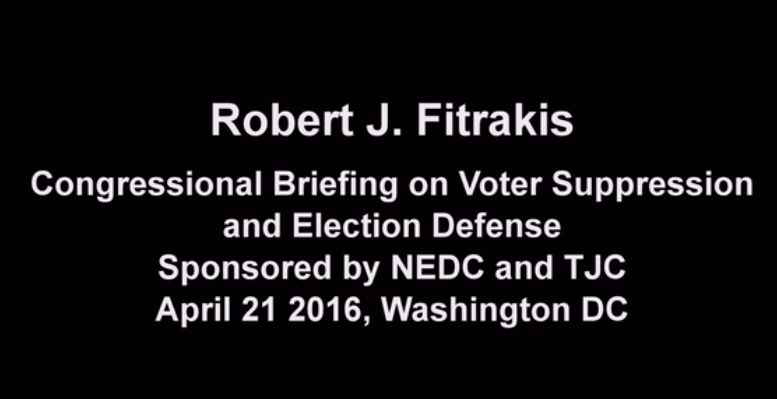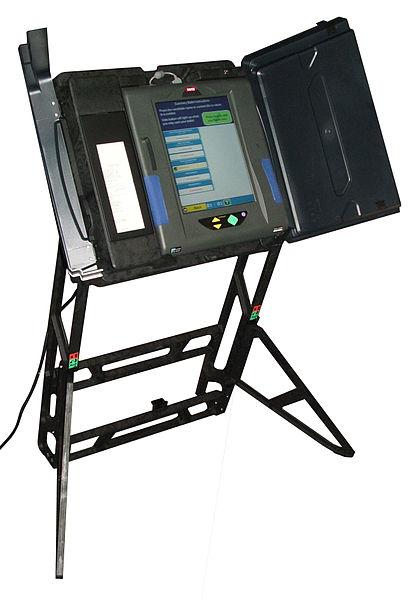 by Bob Fitrakis and Harvey Wasserman
by Bob Fitrakis and Harvey WassermanFinally, the major for-profit media is approaching consensus that it’s easy to hack U.S. political elections. Even candidates Hillary Clinton and Donald Trump are raising unprecedented doubts – from very different directions – about the reliability of the upcoming vote count.
Ultimately, there is just one solution: universal hand-counted paper ballots, with carefully protected voter registration rolls, and a transparent chain of custody.
The corporate media and the Democrats are obsessed with the “Russians.” Donald Trump rants about a mythological army of voters voting multiple times.
But the real threat to our election system comes from private for-profit corporations that register voters, control voter databases, then count and report the vote with secret proprietary software and zero transparency, accountability, or recourse.
After ignoring or attacking the reportage since Florida 2000 of Bev Harris, Greg Palast, freepress.org and numerous others, the corporate media seems finally to be getting the message: under the current system, any American election – even the one for president – can be stripped and flipped by a tiny handful of electronic hackers working anywhere from the Kremlin to a party HQ to a state governor’s office to a teenager’s garage.
Here is some of what the mainstream media is finally admitting. In an article posted on July 28, 2016, NBC News pointed out that our elections are vulnerable to hacking because they “are not part of the vast ‘critical infrastructure protection’ safety net set up by the Department of Homeland Security.”
CBS News wrote August 10, 2016, about “the hackers at Symantec Security Response” who demonstrated how “Election Day results could be manipulated by an affordable device you can find online.”
Former national coordinator for counter-terrorism Richard Clarke, reporting for ABC News on August 19, 2016, analyzed the particular security problems related to battleground states like Ohio and Florida: “In 2000 and 2004, there were only a handful of battleground states that determined which presidential candidate had enough Electoral College votes to win. A slight alteration of the vote in some swing precincts in swing states might not raise suspicion. Smart malware can be programmed to switch only a small percentage of votes from what the voters intended. That may be all that is needed, and that malware can also be programmed to erase itself after it does its job, so there might be no trace it ever happened.” Clarke was on the White House National Security Council during both Bill Clinton’s and George W. Bush’s administrations.
Zeynep Tufekci, an associate professor at the North Carolina School of Information and Library Science, in his August 12, 2016 New York Times op-ed “The Election Won’t Be Rigged but It Could Be Hacked,” wrote: “The mere existence of this discussion is cause for alarm. The United States needs to return, as soon as possible, to a paper-based, auditable voting system in all jurisdictions that still use electronic-only, unverifiable voting machines.”
On August 30, 2016, the Washington Post wrote: “Deleting or altering data on voter rolls could cause mayhem on Election Day disenfranchising some voters. Many voting machines themselves also are vulnerable, especially touch-screen systems that do not create a paper record as a guard against fraud or manipulation.” The Post also supplied a list of the 15 states with the most vulnerable voting systems.
The list of those now admitting the obvious includes the Boston Globe, The Atlantic, USA Today, The Guardian, Mother Jones, and Politico, some of which have previously mocked those of us reporting on this issue. Most important has been the highly influential The Hill, which weighed in on May 2, 2016 with “Election fraud feared as hackers target voter records.” The lede was straightforward: “A series of data breaches overseas are spurring concerns that hackers could manipulate elections in the United States.”
Trump advisor Roger Stone wrote a column in The Hill with the headline: “Can the 2016 Elections Be Rigged? You Bet.” He also referred to our latest summary volume, “The Strip & Flip Selection of 2016: Five Jim Crows & Electronic Election Theft,” as “a must-read book on the strip and flip techniques used to rig these machines.”
But in the 2016 primary election, there are other must-reads as well. Perhaps the most important is Election Justice USA’s report entitled “Democracy Lost: A Report on the Fatally Flawed 2016 Democratic Primaries.” This report cites six major areas of election irregularities in this year’s 26 primary elections:
1) Targeting voter suppression
2) Registration tampering
3) Illegal voter purges
4) Exit poll discrepancies
5) Evidence for voting machine tampering
6) The security (or lack thereof) of various voting machines types.
In their 96-page report, Election Justice researchers documented how Hillary Clinton’s campaign benefited from these “various types of fraud.” Their conclusion: “Based on this work, Election Justice USA has established an upper estimate of 184 pledged delegates lost by Senator Bernie Sanders as a consequence of specific irregularities and instances of fraud.”
Election Justice’s well-documented estimate that Sanders lost 184 delegates means that if the election had been conducted fairly, the Senator from Vermont would now be the Democratic nominee.
Another document essential to understanding election irregularities that allowed Hillary Clinton to capture the Democratic Party nomination is a paper co-authored by Axel Geijsel of Tilburg University in the Netherlands and Rodolfo Cortes Barragan of Stanford University. Their analysis found that primary election results in states with the most vulnerable and hackable voting machines and without a paper trail overwhelmingly favored Hillary Clinton 65 percent to 35 percent. Sanders led Clinton 51 percent to 49 percent in states where the vote count could be verified with a paper trail.
The correlation between the increased Clinton vote and the increased vulnerability of the voting machines has been avoided like the plague by the corporate media.
Equally important to read is mathematician Richard Charnin’s blog. Charnin is a man the mainstream media often attacks – but not with mathematical formulas to rebut Charnin’s detailed analysis. Rather they attack him because, like the vast majority of Americans, he believes that John F. Kennedy was not killed by a lone gunman. In 2016, official Democratic primary vote counts compared to exit poll results were significantly outside the margin of error in 12 of 26 states. Charnin concluded that the probability of those official vote tallies being correct are one in 78 billion. There were no such discrepancies in this year’s Republican primaries.
Now 16 years after the theft of the presidency in Florida 2000, and a dozen since it was done again in Ohio 2004, the corporate media are approaching consensus that it is indeed very easy to strip millions of legitimate citizens from the voting rolls, and then to hack electronic voting machines and computerized central tabulators to flip the official final outcome.
The threat to this year’s election does not come from non-existent armies of mythological hordes voting multiple times. It comes from the private partisan companies with their secret proprietary software that control the voter rolls, the electronic machines, and ultimately the final outcome at all levels of government. The mega-corporations are the ones that flipped George W. Bush into the White House and Hillary Clinton into the Democratic nomination, not to mention manipulating countless Senate, House, and state and local elections along the way.
For a hopelessly vulnerable electronic election system which is flawed, hackable and riggable from top to bottom, there is just one solution: transparent unhackable voter rolls, and universal hand-counted paper ballots open to public scrutiny from the precinct level to the final official tallies, as dutifully reported by our slowly awakening corporate media.
Bob Fitrakis & Harvey Wasserman are co-authors of The Strip & Flip Selection of 2016: Five Jim Crows & Electronic Election Theft, available at www.freepress.org and www.solartopia.org, where Bob’s Fitrakis Files and Harvey’s Solartopia! can also be found.
Disturbing signs of the time-tested “Strip and Flip” strategy for stealing elections have already surfaced in 2016. Will they ultimately decide the outcome, as they have in too many recent elections?
The core approach is to STRIP citizens of their voting rights, then FLIP the electronic vote count if that’s not enough to guarantee a win for the corporate 1%.
Historically, “stripping” has been based on race. It’s rooted in the divide-and-conquer strategies of slavery and Jim Crow segregation. Today it centers on racist demands for photo ID and other scams designed to prevent blacks, Hispanics, the young and the poor from voting.
“Flipping” is related to electronic voting machines, on which the vast majority of Americans will vote this fall. Nearly all these machines were bought with money from the 2002 Help America Vote Act, which came after the theft of the 2000 presidential election. Virtually all these machines are 10 years old or more, and can easily be hacked. Swing states Florida, North Carolina, Ohio, Michigan, Iowa and Arizona, among others, have GOP governors and, except for Florida, secretaries of state who can easily flip the vote count once they are cast, without accountability or detection. Also, private partisan voting machine companies have unlimited access to the electronic poll books, voting machines and central tabulators.
Those who dismiss such warnings as “conspiracy theory” might confront this simple question: “How will the electronic vote count in the 2016 election be verified?”
The answer is simple: “It can’t be.” The vote count in 2016 for the offices of President, US Congress, governorships, state legislatures, county commissioners, dog catchers and thousands of others will come through electronic black boxes. The veracity of the outcomes will vary from state to state based on the whims and interests of those in charge of the electronic tallies.
In the meantime, we have already seen deeply disturbing signs of the “strip and flip” scam in the 2016 primaries. All, of course, have been to the detriment of the Bernie Sanders campaign:
· Despite the claim that Hillary Clinton, “won” the Iowa and Nevada caucuses, there’s clear evidence Bernie was the rightful winner in both states. In Iowa Clinton’s “victory” apparently turned on six coin tosses, all of which she allegedly won.
· There’s clear evidence that Bernie actually won the Massachusetts primary, which the corporate media and official vote count gave to Hillary. Analyst Richard Charnin has examined pre-election polls and post-election exit polls, both showing Bernie substantially ahead of Clinton prior to the voting. In a phenomenon we have seen elsewhere (most notably as George W. Bush “beat” John Kerry in New Mexico 2004), Bernie won all the precincts with hand-counted paper ballots but lost all the ones with electronic voting machines. Exit polls significantly “outside the statistical margin of error” are the international gold standard for determining election fraud. If the U.S. held the same standards as the European Union, the Clinton campaign would be investigated for election fraud not only in the Massachusetts primary but also in Missouri, Illinois and Ohio primaries.
· In Arizona we saw a re-run of Ohio 2004, where left-leaning Democratic urban areas were stripped of precincts and short-changed on voting machines and back-up paper ballots, resulting in long lines and thousands of citizens being deprived of their vote. African-Americans in Cleveland, Columbus, Toledo, Dayton and Cincinnati waited up to seven hours and more to vote in 2004, causing mass disenfranchisement that helped give Bush Ohio and a second term in the White House. In Arizona this year, thousands of citizens were also robbed of their vote due to the elimination of precincts, machine shortages and the failure to provide back-up paper ballots. Many were handed provisional ballots which regularly are discarded and never counted. It is quite likely that with reasonable access to voting, Bernie would have won the Arizona primary.
A wide range of irregularities in other states have also dogged this primary season. They could well be the determining factor in who gets the nomination in both major parties.
A recent study by Harvard and the University of Sydney, Australia found that the United States had the “worst elections of any long-established democracy.” The U.S. ranked 47th out of the 47 long-term democratic nations.
Something serious must be done. Without radical action, these carefully engineered precinct eliminations, ballot and machine shortages, mass disenfranchisements and too much more will not only determine who wins the presidency this fall, but also who controls the Congress, numerous governorships and state legislatures and the whole gamut of elective offices around the country.
In the long run, only universal automatic voter registration, a four-day national holiday for voting, universal hand-counted paper ballots and other reforms will guarantee us a fair and reliable vote count. Posted at www.freepress.org, we call it the “Ohio Plan.”
But none of that will be in place this fall. In our coming articles, and in two weeks with our book THE STRIP AND FLIP SELECTION OF 2016, we will discuss what we can do in the interim.
————————
Bob Fitrakis & Harvey Wasserman have co-authored six books on election protection, including the upcoming power point compendium THE STRIP & FLIP SELECTION OF 2016: FIVE JIM CROWS AND ELECTRONIC ELECTION THEFT. Bob’s FITRAKIS FILES are at www.freepress.org. Harvey’s AMERICA AT THE BRINK OF REBIRTH: THE ORGANIC SPIRAL OF US HISTORY will be published soon via www.solartopia.org.
In March 1994 he served as an international observer for the national elections in El Salvador and in 1993, he visited Reynosa and Matamoros, Mexico as part of a human rights delegation to investigate conditions in the maquilladoras. As a result of the trip, he co-produced a video entitled “The Other Side of Free Trade” shown around the country at colleges and public access stations.
Fitrakis was an international election observer for the 1994 El Salvador presidential election and co-authored and edited the International Observer Election Report. Fitrakis’ investigative reporting on election irregularities and fraud began prior to the Florida debacle of the 2000 election. He uncovered the history and Republican and CIA connections to the electronic voting machine companies in several articles throughout 2000 prior to Election Day. He worked with the late Athan Gibbs, inventor of TruVote voting machines that supplied a paper trail, in exposing the flaws of computer voting machines.
He helped organize Election Protection activities in central Ohio for the 2004 election including Video the Vote and legal observers at the polls. He received international attention after being an Election Protection attorney during the 2004 Ohio presidential election, and subsequently investigating the election irregularities. He initiated the original public hearings at the New Faith Baptist Church and Franklin County Courthouse in Columbus, Ohio two weeks after the November 2, 2004 Election Day to hear sworn testimony and take notarized affidavits from voters and observers who experienced election irregularities. Over 750 people participated in the hearings that were simultaneously broadcast on radio and on international media.
Fitrakis was an Election Protection attorney on November 2, 2004 in Franklin County. He called the first public hearings on voter suppression and election irregularities and was one of four attorneys to file a challenge to Ohio’s presidential elections results: Moss v. Bush and Moss v. Moyer.
Dr. Fitrakis was instrumental in putting together a coalition of nonprofit organizations, public officials, attorneys, voters, videographers, and activists to continue the investigations across Ohio. He helped organize four other public hearings in Cincinnati, Cleveland, Toledo, and Warren, Ohio. In December 2004, Fitrakis testified before the Judiciary Committee of Congress at the request of Rep. John Conyers in both Washington D.C. and Columbus.
The information gathered from the Free Press investigations and hearings resulted in the Conyers Report, “What Went Wrong in Ohio?” released January 5, 2005. Fitrakis spoke to the National Press Club in Washington D.C. on Ohio’s election issues. Fitrakis was one of four attorneys who challenged the election results in federal court immediately after the election, Moss v, Bush, with the assistance of Rev. Jesse Jackson. While working with Jackson, Fitrakis briefed top Democratic leaders, including U.S. Rep. Stephanie Tubbs Jones (D-Cleveland) and Sen. Barbara Boxer (D-CA), and helped organize and craft the language for the first Congressional challenge to the seating of Ohio’s delegates in our country’s history.
Fitrakis briefed John Kerry, worked on election reform with Rep. Maxine Waters (D-LA) and Rep. John Kerry (D-Atlanta), and briefed the Democratic Party Senate leadership. He later briefed the Congressional Progressive Caucus as well as the Congressional Black Caucus and the Senate Democratic leadership. Dr. Fitrakis testified at the Election Assessment hearings in Houston, Texas, which became part of the Carter-Baker Report. Throughout 2005-2007 Fitrakis organized investigators under the auspices of the CICJ to visit key Boards of Elections in Ohio to physically examine and count ballots, videotape and photograph election evidence, and write reports. Much of this evidence appears in his books and in a project he coordinated for an online digital archive.
Fitrakis co-authored What Happened in Ohio? A documentary record of theft and fraud in the 2004 election (New Press) and has authored or co-authored three other election books including How the GOP Stole America’s 2004 Election & Is Rigging 2008 the companion summary book to the 767-page volume Did George W. Bush Steal America’s 2004 Election? Essential Documents, co-edited with Harvey Wasserman and Steve Rosenfeld. He co-wrote the freepress.org article “How a Republican Election Supervisor Manipulated the 2004 Central Ohio Vote” that received the Project Censored Third Most Censored story in the world in 2005. He has written chapters for the book Hacked (Truth Enterprises Publishing) in 2006 and Mark Crispin Miller’s Loser Take All (Ig Publishing) in 2008.
Fitrakis has been interviewed on countless national and local radio and TV programs as an expert on Ohio’s election irregularities and subsequent election reform issues. He was a featured speaker at the first voting rights teach-in in Berkeley in February 2005 and at national organizing conferences for the growing voting rights movement from San Francisco to Nashville to New York City. Fitrakis received a grant to take his books on a west coast book tour from San Diego to Seattle during 2005.
He helped a coalition of individuals and groups hold a 3-day Voting Rights Revival conference in Columbus in 2005 and another in 2008. Over 10 national and international independent video documentaries feature Fitrakis, including the Sundance Award-winning “American Blackout” by Ian Inaba of GNN. Through the Free Press, he and the Ecological Options Network co-produced the short video “Help America Vote on Paper” on election reform advocacy video that has been distributed worldwide. On behalf of the Free Press, Fitrakis wrote and received two national grants to continue the election reform work through 2006 and 2007. Fitrakis was interviewed by Amy Goodman on Democracy Now and by Lou Dobbs on CNN.
Fitrakis ran for Governor of Ohio in 2006 as an independent endorsed by the Green Party on a platform of election reform. He worked with five other independent statewide candidates to place dozens of election rights observers inside the polling sites and Boards of Elections on Election Day throughout Ohio. Gore Vidal volunteered to help Fitrakis with his campaign. Vidal sponsored and appeared alongside him at a fund-raiser and live Pacifica radio broadcast in Santa Monica. Fitrakis successfully brought the election irregularities to public attention, as well as the criminal antics of his Republican opposition for governor Ohio’s Secretary of State J. Kenneth Blackwell was sorely trounced in the election and is no longer a political entity in Ohio, and Fitrakis received 41,000 votes.
As of June 2008, Fitrakis was co-counsel in the King-Lincoln-Bronzeville lawsuit against the Ohio Secretary of State’s office seeking to end racially discriminatory electoral practices in Ohio and to ensure free and fair elections. Fitrakis authored a 50-point consent decree to ensure election integrity in Ohio submitted to the current Secretary of State. Many of these proposals have been adopted by the state of Ohio. He continues to speak on radio and TV programs, present at conferences, and help produce independent election-related videos. He and Wasserman continue to report regularly on election reform issues in the Free Press, on freepress.org and numerous other progressive websites such as Counterpunch, Commondreams, Salon, Alternet, and Bradblog – as well as their own internet radio program at freepress.org/podcasts.
Fitrakis continues to lead annual election protection efforts in Ohio. The post-election report of 2008 was brought before the UN by the International Association of Educators for World Peace. In 2008, the CICJ exposed that over 1.25 million voters had been purged in Ohio and in 2012 was able to document that over one million voters were purged in the Buckeye State. Fitrakis is and Harvey Wasserman in updating their election book for a new edition in 2012, Corporate Vote Theft and the Future of American Democracy.
Fitrakis ran for the 3rd district of U.S. Congress with the Green Party in 2012 and held several press conferences with Green Party presidential candidate Jill Stein about the vulnerabilities of voting machines.
In 2012, Fitrakis uncovered information about Republican presidential candidate Mitt Romney and his family and friends ties to the voting machine company Hart InterCivic. Also that year, the Ohio Secretary of State, Jon Husted, planned to put experimental and untested patches on voting machine tabulators in the state. Fitrakis was the plaintiff in a lawsuit to stop the patches on Election Day that November. The Washington Spectator speculated in an article entitled “Did an Election Day Lawsuit Stop Karl Rove’s Vote-Rigging Scheme in Ohio?” that the legal proceedings may have prevented a stolen election in Ohio.
During the 2016 Democratic primary season, Fitrakis filed a lawsuit to gain access to unadjusted exit poll results from the Edison Research company because of suspicious results in 12 key states. He is a fellow with the American Institute for Democracy and Election Integrity working to research, expose, and prevent election fraud and organize election protection efforts. Fitrakis and Wasserman co-authored another book, “The Strip & Flip Selection on 2016: Five Jim Crows and Electronic Election Theft.”
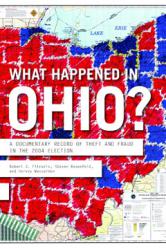
From Nicole’s youtube channel:
“Streamed live on Jun 10, 2016
This week, the video of a meeting about election integrity in California in which attorneys Bob Fitrakis & Cliff Arenbeck explain why they’ve filed lawsuits demanding the release of exit polling and returns to show that fraud is inherent in our system. This morning, Bob Fitrakis joins in to tell us of their concerns, give an update on the lawsuit, and what comes next.
Find out more and watch the full video of the 5-27 meeting at trustvote.org
In hour two, we’ll open the phones to get your reaction at 954-889-6410 or via Skype to nicolesandler.”
Fitrakis from Ben-Zion Ptashnik on Vimeo.
Other links and info:
http://columbusfreepress.com/article/how-voter-suppression-efforts-are-threatening-our-democracy
Columbus Alive Archive Article
The gatekeepers (Bail bonds)
05/07/1997
FEATURED ARTICLE
The gatekeepers
Striking it rich in the bail bond business
by Bob Fitrakis
Despite a city ordinance prohibiting the soliciting of business by bail bondsmen, “in or around any court or public place,” a month-long investigation by Columbus Alive revealed that the law is routinely ignored. One firm, SMD & HLS Bonding Company, appears to be running its business from the “interview” room next to arraignment Courtroom 4D in the Municipal Court building. SMD & HLS bail bonders linger in the hall and sit in the back of the court and appear to be soliciting business.
The so-called public “interview” room appears to function as a high-powered office for the SMD & HLS Bonding Company, listed in the yellow pages as four different firms: Handler Bonding, Lowell Fox, Sam English and A-Aa Absolute Bail Bonds. Still appearing in the yellow pages entry is a photo of Sam English, who has been dead for several years. As of the writing of this article, the woman who answers the phone at the Sam English firm tells callers that Mr. English “isn’t in.”
Although the courthouse is a no-smoking public building, smoke wafts from the interview room when the door is opened as bail bondsmen hustle family and friends of defendants from the arraignment court to their office equipped with phones and a criss-cross phone directory. As one highly placed law-enforcement source put it, “It’s the old adage. The best place to hide illegal activity is out in the open.”
A non-Handler bondsman pointed out what he saw as an analogous situation. In 1990, the Board of Commissioners on Grievances and Discipline of the Supreme Court of Ohio suspended Judge Ralph D. Dye Jr. of McConnelsville for using public space to conduct private business. The board labeled his free-rent arrangement at the courthouse “inexcusable, unfair to other attorneys and unethical.”
In a letter dated November 21, 1996, in response to a public records request, Municipal Clerk of Courts Paul Herbert, stated: “I have not been designated, nor do I have any authority to enforce the use of the conference room next to Court Room 4D. …The rules for the use of the room have been clearly posted on the door.”
Asked if his bondsmen are soliciting business on the fourth floor, Handler said in a telephone interview: “Totally untrue. I don’t need to solicit. I’ve been in business 25 years. I advertise. People refer other people to me.”
Are his bondsmen running a business out of the Interview room next to 4D? “No,” Handler responded.
Most court officials say that the interview room is set up to serve lawyers and their clients for privileged private discussion. On three different occasions, when Columbus Alive watched the Interview Room, the only people inside were bail bondsmen. The rules, according to a non-Handler bondsman, are “first-come, first-serve. But, it’s like the Old West. [Handler]’s got Woody Fox, a retired Columbus police officer working as a bondsman. He’s got Al Clark, former chief deputy at the sheriff’s department, and when you go up there, Handler’s got the nerve to tell you that you’re not supposed to be there. ‘No soliciting.’ So now I just sit by the phone and wait for people to call for bonds. It’s cheaper. Everyone over there has their palms out; if you pay one, you’ve got to pay ’em all.”
Handler now appears to be the top gun, but not after a fight—literally. In 1994, the Columbus Dispatch reported that “Bondsman Jack Bates said his nose was bloodied and his face bruised when Mark Glaser, a bondsman with Harvey Handler’s bail bonding agency, struck him in the face on the fourth floor of the Franklin County Municipal Court.”
Ironically, bail bondsmen were supposed to be a thing of the past. In 1972, Ohio Chief Justice C. William O’Neill attacked the Ohio General Assembly for yielding to “pressure from bail bondsmen in rejecting rules for criminal procedure” reforms proposed by the Ohio Supreme Court in January of ’72. In a Dispatch article, O’Neill stated that, “In 90 percent of the cases the bail bondsman renders no service and takes no risk, but keeps his profit.”
By 1974, the Franklin County Municipal Court initiated its Pre-Trial Release Program (PTRP) in hopes of eliminating the need for costly and often unnecessary bond fees in most criminal cases. The era of reform is long over in the Franklin County Municipal Court. Herbert acknowledges in his letter that between January 1, 1996 and September 30, 1996 SMD & HLS Bonding Company wrote far more bonds in Municipal Court than any other firm. The breakdown is as follows: SMD & HLS Bonding Company – 3411; Columbus Bail Bonds – 891; Chuck Brown Bail Bond Agency – 603; International Bonds – 424; Bates Bonding – 52; American Bail Bond Agency – 15; other – 75.
Whether it’s legal or not is a question few judges or court officials care to probe. A cozy relationship exists between bail bondsman Harvey Handler—who manages or controls the four different bail bonding agencies in Columbus—and judges, Clerk of Court officials and court employees. Handler is a major political contributor to judicial and Clerk of Court office candidates and sometimes generous benefactor to court employees.
“Handler runs the fourth floor,” said former bail bondsman Bill Neil. “It’s a protected racket. The reason they like the fourth floor of Muni Court is because the felons are initially arraigned there, even though they’re tried in Common Pleas.
“It’s easy money. They can bail somebody out and they know the charges will be dropped within two weeks in Municipal Court because they have to be tried in Common Pleas. They’re just taking people’s money with no risk involved,” explained Neil.
Neil claims he went “broke in the business. Every two weeks, when the clerks didn’t get paid, I had to spend $50 or $60 to get pizzas…. And I had to give a security guard 30 bucks to pass out my business card.”
Under the current system, for example, if you are arrested for felonious assault and your bond is set at $5,000, you must pay 10 percent, or $500, to the court for an “appearance bond” or $500 to a bail bondsman for a “surety” bond. In the case of an appearance bond, you would get all but 10 percent ($450) back when you appear in court. With a surety bond from a bail bondsman, you would get nothing back when you appear at trial. But if you paid a surety bond and failed to show at trial, the bondsman is legally liable for the entire $5,000 bond.
The type of bonds are set at the judge’s discretion. Judges may also set recognizance bonds and release the defendant without posting any cash.
“Judges vary greatly. When I was in the business, if [Municipal Court Judge] Anne Taylor was on the bench doing arraignments, we took the week off,” Neil explained.
Curiously, Criminal Rule 46 of Ohio Rules of Criminal Procedure concerning the “Pre-trial release in felony cases,” provides that judges should use “personal recognizance” or an “unsecured appearance bond” as the “preferred method of release.” But few judges besides Taylor appear to follow it.
Since the Municipal Court cannot try felony cases, arrested felons are seen by municipal judges primarily for the setting of bond. Court records indicate that arrested felons are routinely arraigned and bonded on the fourth floor of the Municipal Court building and, just as routinely, the charges are dismissed a short time later. Defendants are told that the case will “be dismissed for possible future indictment.”
A grand jury later meets in the Common Pleas Court and holds a hearing. If an indictment is handed up, a summons is usually issued for a Common Pleas court appearance. Thus, what the bail bondsmen know is that there is little or no risk involved in forfeiting a surety bond in Municipal Court since the charges against the defendants will be dismissed. “It’s a scam,” as one bondsman put it. By not carrying over the bonds from the Municipal Court arraignments of felons to Common Pleas Court cases, Handler and other bondsmen are regularly pocketing thousands of dollars in risk-free money. And defendants are often surprised when they are required to repost bond money when they are summoned to Common Pleas Court.
If Municipal Clerk of Courts Herbert, “wanted to put his foot down, he could end this practice tomorrow,” said a S. High Street bondsman critical of Handler. “I’ve practiced in Marion County, Delaware County, Madison County and Franklin County. This is the only place that allows this to go on,” he added.
Herbert, who is up for re-election this year, is on record defending the practices of his court. “…You must realize that surety bonds provide a valuable service to the criminal justice system. Not only do you have agents with a vested interest in catching and returning defendants to court to stand trial for their conduct, but the court holds the security (in the form of a power) that can be executed against for the amount of the bond if the defendant does not return or the agent does not pay the bond.”
Herbert pointed out in a telephone interview Monday that the interview room is “open to the public, attorneys and bondsmen.” While his office is on the fourth floor, he said he was unaware of any soliciting of business by bondsmen. “I have no idea; I don’t police those rooms.” He suggested that Administrative Judge David Fais or Building Manager Bill Charlton would be responsible. “I try to stay out of that area,” Herbert added.
Asked about his relationship with Handler, Herbert acknowledged that Handler is a political contributor to Herbert and other judges and court-related officials, but not a “big donor.” Herbert did term Handler “very supportive” of his own political campaign.
Both Neil and other bondsmen charge that the Clerk’s office allows another infamous “rip-off” of criminal defendants. All bonds include an additional fee collected for the Victims of Crime Fund and the Public Defender’s Office. In felony cases, this amounts to $41: $30 to the Victim’s Fund and $11 to the Public Defenders. When cases are dismissed, or defendants are found not guilty, the money is returned to the bondsman who posted it, not to the defendant who supplied the cash. Legally, the money belongs to the defendants, but all too frequently, bondsmen fail to return the money and pocket it as pure profit. With no court enforcement to return the funds, the bail bondsmen benefit. “Money for nothing,” one bondsman explained. Neil pointed out that since most of the defendants are poor and uneducated, they are “easy marks” who don’t understand the legal system and are unlikely to protest the practice. Plus, their reputation as suspected criminals does not garner much sympathy for their plight.
Asked if the bondsmen are essentially taking defendants’ money twice, Herbert responded, “I suppose they would [be]. You need to ask the prosecutors, they’re the ones that dismiss the cases.”
According to a 1994 Dispatch article, 1,279 defendants released on surety bonds set in Municipal Court skipped bond. Neil and other bail bondsmen charge that Municipal Clerk of Court Herbert and Franklin County Clerk of Courts Jesse Oddi show favoritism to Handler’s firms. “Hell, when I had to pay a bond for a skip, the deputy clerks used to joke that ‘Handler’s guys are never down here,’” said Neil.
The Dispatch article also reported that: “In reality, court officials say more than half of bond forfeitures are set aside by judges. They may forgive the debt at their discretion.” Court records obtained by Columbus Alive indicate that court officials seem to be more forgiving for the Handler firms than others. Take the case of Dean Hinchee, arrested in 1991. Handler posted a $3,500 surety bonded for Hinchee on November 11, 1991. When Hinchee failed to show on January 28, 1992, Handler had 30 days to produce him or forfeit the bond. In a November 1996 billing to the SMD & HLS Bonding Company, a Dean Hinchere is listed instead of Hinchee. Although the names are spelled differently, Alive has obtained copies showing that the case numbers are the same: 29681. In the ’96 Handler billing the court requests only $350 from SMD & HLS Bonding when the full amount that should have been forfeited by Handler in 1992 for Hinchee’s court skip is $3,500.
Either by accident or design, Franklin County Courts are apparently shaving a zero off of Handler’s bond forfeiture bills, in effect billing one of the court’s major political donors at only 10 percent of the amount due.
Asked about the apparent shaving, Herbert said, “It’s currently being litigated” and refused further comment.
Asked about the allegations that bills are being shaved, Handler answered: “Totally incorrect. It doesn’t deserve a response. My attorneys are dealing with it.”
When probed about allegations that court employees have accepted gratuities from Handler and other bail bondsmen, Herbert said, “I don’t think that’s going on; if it is, they need to knock it off. We’re not supposed to be taking anything of value; but it’s a gray area of the law.” Herbert pointed out that, unless there was a quid pro quo, a gift for service, any gratuities or perks provided court officials by bondsmen probably aren’t illegal. “We should avoid the appearance of impropriety, and I’ve instructed my people not to accept any gifts.”
The billing of bondsmen seems to be a haphazard system. Herbert and his deputy clerks reportedly have busied themselves of late putting records into “storage.” This may make it all the more difficult to account for the total amount of forfeited bonds owed the Municipal Court by bond firms. In an independent audit by KPMG Peat Marwick LLP for the period January 1, 1994 through December 31, 1994, the report states that the Municipal Court practices “other than generally accepted accounting principles.” In a June 25, 1996 letter, State Auditor Jim Petro—currently lobbying to head the U.S. General Accounting Office—”accepted” the KPMG report “in lieu of the audit required by Section 117.11 Revised Code.” Petro noted “The Auditor of State did not audit the accompanying financial statements and accordingly, we are unable to express, and do not express an opinion on them.”
The obvious beneficiaries of such a system are not the public or poor and uneducated defendants and their families and friends, but the incumbent judges and clerk candidates who receive political donations, and the bonding companies who benefit from court officials’ lack of oversight.
2009 Robert Krutko story states business in Key West was destroyed/stolen mob style was to be extradited then tortured in Franklin County Jail on a civil case.

Fight Back – Episode: 01/08/16 The case of Robert Krutko – See more at: http://www.talktainmentradio.com/shows/fightback.html#sthash.3vRBDnTF.dpuf

Get ready: the Republicans may not know it, but they’ve all but certified their ticket for 2016, and they will probably win.
The saturation bloviation that followed this week’s Republican presidential debates missed some monumental moments, including:
(1) There was one (and ONLY one) candidate on the stage that had anything meaningful to say. It was Rand Paul. What he said about war and marijuana were of serious significance.
(2) The GOP hard core on the stage and in the audience certified their obeisance to a free pass for the horrific presidency of George W. Bush, thereby opening the door for his brother, who can almost certainly win if he runs with the guy from Ohio.
Let’s deal first with Rand Paul. Like his father (and unlike virtually anyone else in the GOP) the Senator from Kentucky seems to have some actual principles. Both Pauls have been firmly committed to the legalization of marijuana for many years, and have not wavered.
When Rand (who’s a medical doctor) discussed pot in the debate, he couched it in terms of those who are struggling to get medical marijuana treatment for their children. Rather than slamming him, Jeb Bush then sheepishly admitted to having smoked it many years ago, puffing it up with the obligatory joke about his truly terrifying mother.
That’s old news. What’s new came from Chris Christie. The New Jersey governor has proudly proclaimed that as president he would send the drug gestapo even (or especially) into states where pot has been legalized to “enforce federal law.”
But when confronted with Sen. Paul’s lament on medical marijuana, Christie whimpered that NJ also has medical marijuana, and that he would not interfere with that.
It was utterly ridiculous. But it underscored how far pot has moved toward full legalization. These were the REPUBLICANS! Only Carly Fiorino jumped in with a lament over the death of her drug-addicted step-daughter, which somehow seemed to support her desire to jail all pot smokers.
Those of us in Ohio were then treated to a high-production-value commercial (it ran at least twice during the debate) featuring a Buckeye mother complaining that her daughter suffers from seizures, and that she and her husband have been forced to move to Colorado to get medical marijuana.
Bordering on the surreal for those of us living in the midwest, the ad was sponsored by a very well-funded group of corporatists who’ve put a legalization measure on the ballot here.
That initiative might fail. But Toledo has just voted to decriminalize and the floodgates feeding full legalization are clearly open. That the national Republicans (Fiorino and Christie aside) have finally stopped falling over themselves to slaughter anyone who even mentions legal pot is good news.
It should be further noted that when challenged, none of the other candidates joined Jeb in admitting that they inhaled. But here in Columbus we are surrounded by former college classmates of Governor Kasich who swear without reservation that he was (and may still be) a major pothead.
There are also those who claim he’s bisexual, but that’s another story. (We will be publishing CITIZEN KASICH, a study of the man who may be Vice President, in early 2016).
Rand Paul’s powerful denunciations of foreign intervention in general and the Iraq war in particular were also significant. His father Ron has delivered some uniquely cogent denunciations of our disaster in Vietnam. Rand has been equally clear about the on-going imperial fiasco in the Middle East.
Here again we saw a mixed bag on stage. There was serious hemming and hawing about how bad George W. Bush’s plunge into the quicksand really was.
But Jeb was ready. “He kept us safe,” he said of his older brother.
It was an astonishing lie. It was W running the country when 9/11 happened. New York and then the nation were permeated with toxic dust that poisoned our persona and gutted our civil liberties.
Bush2 then presided over one of the nation’s most grotesque military failures, followed by an utter dereliction of duty during Hurricane Katrina, leading to the destruction of an entire great city and many unnecessary deaths. And that’s just for starters.
It is safe to say our nation will never recover from W’s eight years of unelected misadventures.
But the GOP faithful did not groan and puke over Bush3’s defense of his brother. They applauded! Wildly!!
This, of course, in the lair of the Grand Illusionist, the Ronald Reagan who covered his own catastrophic regime with the B-movie madness of endless upbeat enthusiasm, even while delivering a saturation disaster.
Suddenly all the common wisdom that the GOP would not go for Bush3 evaporated. Here was the brother and son of previous Republican presidents, standing tall on a stage filled with utterly boring haters, hacks and one very rich performance artist. The Bush pall suddenly turned to sheen, at least in GOP eyes. Don’t “misunderestimate” that moment, as Bush2 might say.
The poll numbers still seem to favor Trump. But he is too much of a wild card for America’s oligarchs. On three key issues he actually veers left. He supports a single-payer health care system; he says he wants the tax loophole closed for hedge fund financiers; and he clearly believes that children’s vaccines can cause autism. Sooner or later, the corporate/media hammer will come down on Trump, and he’ll have to decide whether to run third party. If he does, the GOP (which learned a major lesson with Ross Perot in 1992) will have to decide whether they’ll let him live. THAT will be the real moment of truth in 2016.
Only Kasich said anything else of significance. Briefly but not too subtly, he commented essentially that he has a lock on Ohio. It was an apparent throw-away comment early in the game, missed by most.
Kasich’s latest insult to Hispanic voters is emblematic of his tone-deaf nature. Within the party, it will pass.
But come next fall, one need only do the quick math: Bush carries Florida, Kasich counts Ohio, game over.
Do not “misunderestimate” the fact that 80% of the votes in 2016 will be cast on electronic machines, with access controlled on electronic registration rolls. With this comes a network of private, partisan, for-profit companies that favor the Bushes.
The GOP has both governors and secretaries of state in Florida, Ohio, Michigan, Iowa and Arizona. There are many others, but those five swing states could be more than enough.
(We’ll deal with this in THE SIXTH JIM CROW: ELECTRONIC ELECTION THEFT & THE STRIP/FLIP OF 2016, also to be published early next year).
Unless something is done about it between now and November 2016, there is no public recourse on any of the machines on which this election will be conducted. They are privately owned. The source code is proprietary. The boards of election have no access. There will be no meaningful recounts.
No matter how the public votes, wherever the governor and secretary of state are of the same party, the outcome can be altered with a few keystrokes in a few seconds. And unless things change, there will nothing to be done about it, especially in light of the billions the Koch Brothers and other GOP stalwarts are spending to buy the White House.
The voter rolls can be stripped and the vote count flipped with Republican spare change.
Yes, this is conspiracy theory. But anyone who doubts the conspiracy has not closely looked at the selections of 2000 and 2004.
The ones that brought us George W. Bush, who “kept us safe.”
——————————————
Bob Fitrakis & Harvey Wasserman have co-written six books on electronic election theft. They will publish two new ones this election season: THE SIXTH JIM CROW: ELECTRONIC ELECTION THEFT & THE STRIP/FLIP OF 2016, and CITIZEN KASICH. Watch for them at www.freepress.org.

Get ready: the Republicans may not know it, but they’ve all but certified their ticket for 2016, and they will probably win.
The saturation bloviation that followed this week’s Republican presidential debates missed some monumental moments, including:
(1) There was one (and ONLY one) candidate on the stage that had anything meaningful to say. It was Rand Paul. What he said about war and marijuana were of serious significance.
(2) The GOP hard core on the stage and in the audience certified their obeisance to a free pass for the horrific presidency of George W. Bush, thereby opening the door for his brother, who can almost certainly win if he runs with the guy from Ohio.
Let’s deal first with Rand Paul. Like his father (and unlike virtually anyone else in the GOP) the Senator from Kentucky seems to have some actual principles. Both Pauls have been firmly committed to the legalization of marijuana for many years, and have not wavered.
When Rand (who’s a medical doctor) discussed pot in the debate, he couched it in terms of those who are struggling to get medical marijuana treatment for their children. Rather than slamming him, Jeb Bush then sheepishly admitted to having smoked it many years ago, puffing it up with the obligatory joke about his truly terrifying mother.
That’s old news. What’s new came from Chris Christie. The New Jersey governor has proudly proclaimed that as president he would send the drug gestapo even (or especially) into states where pot has been legalized to “enforce federal law.”
But when confronted with Sen. Paul’s lament on medical marijuana, Christie whimpered that NJ also has medical marijuana, and that he would not interfere with that.
It was utterly ridiculous. But it underscored how far pot has moved toward full legalization. These were the REPUBLICANS! Only Carly Fiorino jumped in with a lament over the death of her drug-addicted step-daughter, which somehow seemed to support her desire to jail all pot smokers.
Those of us in Ohio were then treated to a high-production-value commercial (it ran at least twice during the debate) featuring a Buckeye mother complaining that her daughter suffers from seizures, and that she and her husband have been forced to move to Colorado to get medical marijuana.
Bordering on the surreal for those of us living in the midwest, the ad was sponsored by a very well-funded group of corporatists who’ve put a legalization measure on the ballot here.
That initiative might fail. But Toledo has just voted to decriminalize and the floodgates feeding full legalization are clearly open. That the national Republicans (Fiorino and Christie aside) have finally stopped falling over themselves to slaughter anyone who even mentions legal pot is good news.
It should be further noted that when challenged, none of the other candidates joined Jeb in admitting that they inhaled. But here in Columbus we are surrounded by former college classmates of Governor Kasich who swear without reservation that he was (and may still be) a major pothead.
There are also those who claim he’s bisexual, but that’s another story. (We will be publishing CITIZEN KASICH, a study of the man who may be Vice President, in early 2016).
Rand Paul’s powerful denunciations of foreign intervention in general and the Iraq war in particular were also significant. His father Ron has delivered some uniquely cogent denunciations of our disaster in Vietnam. Rand has been equally clear about the on-going imperial fiasco in the Middle East.
Here again we saw a mixed bag on stage. There was serious hemming and hawing about how bad George W. Bush’s plunge into the quicksand really was.
But Jeb was ready. “He kept us safe,” he said of his older brother.
It was an astonishing lie. It was W running the country when 9/11 happened. New York and then the nation were permeated with toxic dust that poisoned our persona and gutted our civil liberties.
Bush2 then presided over one of the nation’s most grotesque military failures, followed by an utter dereliction of duty during Hurricane Katrina, leading to the destruction of an entire great city and many unnecessary deaths. And that’s just for starters.
It is safe to say our nation will never recover from W’s eight years of unelected misadventures.
But the GOP faithful did not groan and puke over Bush3’s defense of his brother. They applauded! Wildly!!
This, of course, in the lair of the Grand Illusionist, the Ronald Reagan who covered his own catastrophic regime with the B-movie madness of endless upbeat enthusiasm, even while delivering a saturation disaster.
Suddenly all the common wisdom that the GOP would not go for Bush3 evaporated. Here was the brother and son of previous Republican presidents, standing tall on a stage filled with utterly boring haters, hacks and one very rich performance artist. The Bush pall suddenly turned to sheen, at least in GOP eyes. Don’t “misunderestimate” that moment, as Bush2 might say.
The poll numbers still seem to favor Trump. But he is too much of a wild card for America’s oligarchs. On three key issues he actually veers left. He supports a single-payer health care system; he says he wants the tax loophole closed for hedge fund financiers; and he clearly believes that children’s vaccines can cause autism. Sooner or later, the corporate/media hammer will come down on Trump, and he’ll have to decide whether to run third party. If he does, the GOP (which learned a major lesson with Ross Perot in 1992) will have to decide whether they’ll let him live. THAT will be the real moment of truth in 2016.
Only Kasich said anything else of significance. Briefly but not too subtly, he commented essentially that he has a lock on Ohio. It was an apparent throw-away comment early in the game, missed by most.
Kasich’s latest insult to Hispanic voters is emblematic of his tone-deaf nature. Within the party, it will pass.
But come next fall, one need only do the quick math: Bush carries Florida, Kasich counts Ohio, game over.
Do not “misunderestimate” the fact that 80% of the votes in 2016 will be cast on electronic machines, with access controlled on electronic registration rolls. With this comes a network of private, partisan, for-profit companies that favor the Bushes.
The GOP has both governors and secretaries of state in Florida, Ohio, Michigan, Iowa and Arizona. There are many others, but those five swing states could be more than enough.
(We’ll deal with this in THE SIXTH JIM CROW: ELECTRONIC ELECTION THEFT & THE STRIP/FLIP OF 2016, also to be published early next year).
Unless something is done about it between now and November 2016, there is no public recourse on any of the machines on which this election will be conducted. They are privately owned. The source code is proprietary. The boards of election have no access. There will be no meaningful recounts.
No matter how the public votes, wherever the governor and secretary of state are of the same party, the outcome can be altered with a few keystrokes in a few seconds. And unless things change, there will nothing to be done about it, especially in light of the billions the Koch Brothers and other GOP stalwarts are spending to buy the White House.
The voter rolls can be stripped and the vote count flipped with Republican spare change.
Yes, this is conspiracy theory. But anyone who doubts the conspiracy has not closely looked at the selections of 2000 and 2004.
The ones that brought us George W. Bush, who “kept us safe.”
——————————————
Bob Fitrakis & Harvey Wasserman have co-written six books on electronic election theft. They will publish two new ones this election season: THE SIXTH JIM CROW: ELECTRONIC ELECTION THEFT & THE STRIP/FLIP OF 2016, and CITIZEN KASICH. Watch for them at www.freepress.org.
Categories
Pages
- About
- About Bob
- Bob Fitrakis Academics
- Cookie Policy (EU)
- Events
- Green Party to Obama: Whether foreign or domestic, it’s time for America to cut oil and gas from our energy diet
- Home
- Opt-out preferences
- Understanding Hackwell’s Right Wing Agenda
- Video Collection
- What Happened in Ohio? A Documentary Record of Theft and Fraud in the 2004 Election
- Bob Fitrakis For Ohio U.S. House District 3 Green Party
Categories
- Alt Energy
- Archived Event
- ART
- Bob and Connie's Hot Topics
- Bob's Hot Topics
- Campaign Updates
- Clean Elections
- Corporate Rule
- Debate
- Drugs
- Economic Justice
- Economics
- Education
- Election Integrity
- End War
- Endosement
- Environment
- Event
- Events
- Fighting Corruption
- fitrakis POER
- Grassroots Activism
- Green Party
- Green Party Local
- Green Party National
- Green Party State
- Green Technology
- Health Care
- History
- Immigration
- Investigation
- Investigations
- Issues
- Media
- No Nukes
- Occupy
- One Of Bob's Best
- Petition
- PETITIONS
- police officers for equal rights
- Politics
- Prisons
- Racism
- Rights and Liberties
- Security Industrial Complex
- Social Event
- Social Events
- Stop the War
- Universal Suffrage
- Women's Rights

